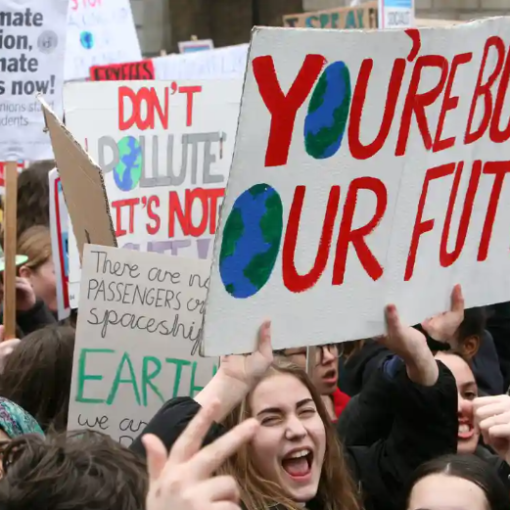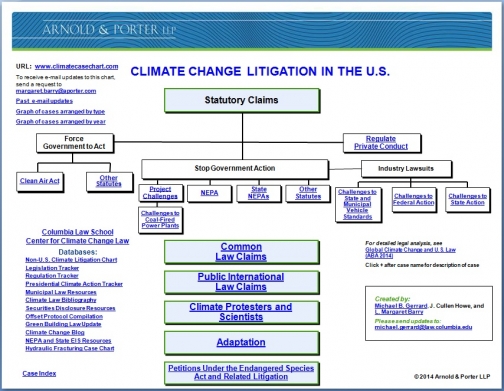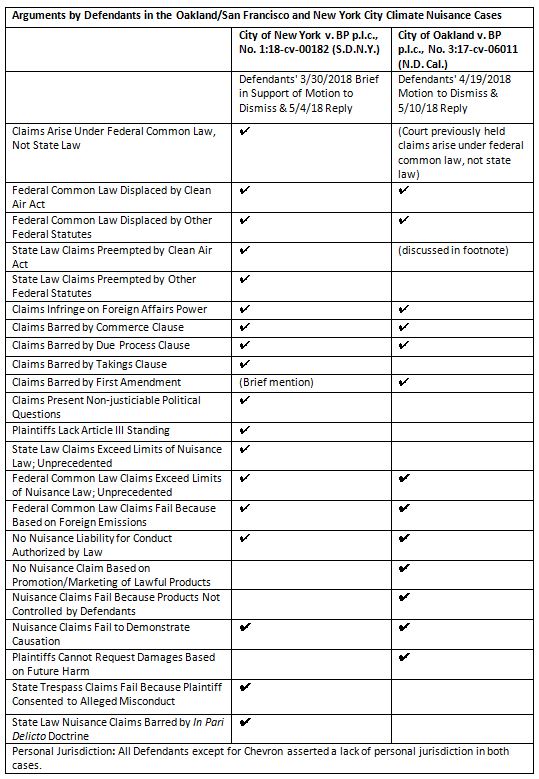
By Korey Silverman-Roati and Maria Antonia Tigre
On November 22, 2022, sixteen municipalities of Puerto Rico filed a lawsuit in the federal district court in Puerto Rico seeking to hold coal, oil, and gas companies liable for losses resulting from storms during the 2017 hurricane season and ongoing economic losses since that time. In Municipalities of Puerto Rico v. Exxon, the cities and towns allege that the fossil fuel companies were liable because they knowingly produced and marketed products that have caused climate change harms, while concealing and misrepresenting the associated dangers. The case is unique for a number of reasons – it is the first climate damages case against fossil fuel companies filed in Puerto Rico, the first climate case against fossil fuel companies alleging harms against cities as a class of plaintiffs, and the first climate case to include Racketeer Influenced and Corrupt Organizations Act (RICO) claims.
The case may also be understood as forming part of a broader U.S. and global climate litigation movement. Cities, counties, and states across the U.S. have filed more than twenty cases seeking damages from fossil fuel companies for climate harms. Many of those cases include similar arguments that the companies knowingly marketed harmful products and misled the public about those harms. Moreover, the case in Puerto Rico comes after recent litigation successes in Europe and elsewhere around the world, with courts holding governments and companies accountable for climate harms.
Summary of the complaint
The municipalities brought the action in the District of Puerto Rico on their own behalf as well as on behalf of a proposed class of all of Puerto Rico’s municipalities. Relying on the Climate Accountability Institute’s Carbon Majors research, the municipalities allege that the defendants were responsible for 40.01% of all global industrial greenhouse gas emissions from 1965 to 2017, and that these collective emissions were a “substantial factor in the increase in intensity of the 2017 Atlantic Hurricane Season.” The municipalities allege that Puerto Rico “suffered apocalyptic damage” from two 2017 storms—Hurricanes Irma and Maria—which they alleged were intensified by climate change, “as accelerated by Defendants’ consumer products and conduct.” The complaint cites estimates that $124 billion will be needed to rebuild and repair the damage caused by the hurricanes.
The plaintiffs contend that the defendants are liable because “they knowingly caused and contributed to the worsening of the climate change by producing, promoting, refining, marketing, and selling fossil fuel products … that have caused and continue to cause the devastating effects of climate change, while concealing and misrepresenting the dangers associated with the use of fossil fuel-based products, including the increased frequency of more dangerous storms.” The complaint alleges a “corporate worldwide strategy” to hide information linking the defendants’ products to acceleration of climate change and to an increased likelihood “that Puerto Rico and thus the Plaintiff Municipalities would be ravaged by dangerous, deadly storms.” A similar climate denial argument has been made in other cases and seems to be gaining strength due to increased evidence and research of corporate misinformation (see, e.g., here and here). In In re Greenpeace Southeast Asia and Others, the Philippines Human Rights Commission found that Carbon Majors (i.e. the world’s largest producers of carbon fuel and cement) not only were well aware of the climate harms of fossil fuel products since 1965 but also engaged in willful obfuscation and obstruction to delay meaningful environmental and climate action for decades (see more here).
In addition to more intense storms, the municipalities allege other physical climate change impacts, including coral reef degradation and massive algal blooms, as well as social, educational, and economic losses, including increased immigration from the municipalities and damages to the agricultural industry. The municipalities ask that the defendants pay costs the plaintiffs have already incurred and would continue to incur due to climate change. They also seek punitive damages, disgorgement of profits, pre-judgment interest, attorneys’ and expert witness fees and other costs, and other equitable, declaratory, and/or injunctive relief “to assure … an effective remedy.”
In all, the municipalities assert 14 causes of action under federal and Puerto Rico law: the federal RICO claims, claims of common law consumer fraud and conspiracy to commit common law consumer fraud and deceptive business practices, claims under Puerto Rico’s statute prohibiting false or misleading advertisements and practices, federal antitrust claims, claims under Puerto Rico’s nuisance statute, strict liability claims based on failure to warn and design defect, a negligent design defect claim, and a cause of action for unjust enrichment/restitution.
Cases brought by cities
The case brought by the municipalities of Puerto Rico follows five years of other cities, counties, and states filing suits against fossil fuel companies across the U.S. These claims have mostly been filed in state court, and the defendants have universally sought to have them removed to federal courts. The vast majority of courts, including the First, Third, Fourth, Ninth, and Tenth Circuit Courts of Appeals have ruled that the cases should be sent back to state courts. At the time of writing, petitions for writ of certiorari have been filed in the Supreme Court seeking review of remand decisions in the Fourth, Ninth, and Tenth Circuits. In the case that has proceeded the furthest in state court, City & County of Honolulu v. Sunoco LP, a Hawaii state court rejected fossil fuel companies’ motions to dismiss for failure to state a claim and lack of personal jurisdiction, allowing the case to proceed.
Similar to the municipalities of Puerto Rico, the city and state plaintiffs in other cases allege millions to billions of dollars in damages from climate change harms. Rebuilding infrastructure in response to past climate harms and making infrastructure more resilient to climate damages will be extremely costly for these subnational governments. The question of who will pay for those costs, the general public or fossil fuel companies, is at issue in the cases.
Outside of the U.S., climate litigation brought by cities and other subnational jurisdictions is still rare. One successful example is found in France. In Commune de Grande-Synthe v. France, the municipality of Grande-Synthe and its mayor filed a lawsuit against the national government to demand that they take all necessary measures to curb greenhouse gas emissions according to commitments made at the international and national levels. Noting the vulnerability of the municipality as a coastal community, the Council of State ordered the French government in 2021 to “take all the measures necessary” to bend the curve of GHG emissions to meet climate goals, including a 40% reduction by 2030.
Building on corporate accountability cases worldwide
Building on the efforts of investigative journalists, and the facts alleged in complaints raised by other local jurisdictions, the municipalities of Puerto Rico allege a pattern of fossil fuel company deception. The events leading to the filing of the case include parallels with the Carbon Majors inquiry into fossil fuel companies in the Philippines (In re Greenpeace Southeast Asia and Others), which was a seven-year inquiry by the Philippines Human Rights Commission into the responsibility of Carbon Majors for the adverse effects of climate change. The inquiry was sparked by Greenpeace and other nongovernmental organizations (NGOs) after particularly violent typhoons, and also relied on research attributing the majority of greenhouse gas emissions to Carbon Majors. The quasi-judicial findings of the Commission were unprecedented in attesting to the Carbon Majors’ misrepresentation and denial of the effects of climate change, pushing the needle of accountability and challenging the political structures that have maintained climate inaction. The findings include a series of recommendations to curb carbon emissions. The recommendations were directed not only at the Carbon Majors, but also at governments, financial institutions and investors, international bodies, National Human Rights Institutions, courts, NGOs, legal professionals, and citizens.
The push for increased transparency is also reflected in climate litigation cases related to greenwashing, in which NGOs have alleged that certain companies’ net zero claims are misleading. For example, in a case brought earlier this year by three French NGOs against TotalEnergies and a subsidiary, the plaintiffs rely on consumer protection laws to argue that the energy company has pursued unfair commercial practices and misleading advertising by rebranding the company as environmentally sustainable, aiming for net zero by 2050 (Greenpeace France and Others v. TotalEnergies SE and TotalEnergies Electricité et Gaz France). In Australia, a shareholder advocacy NGO sued oil and gas company Santos for claiming to provide clean energy despite using natural gas and providing a misleading plan to achieve net zero emissions (Australasian Centre for Corporate Responsibility v. Santos). Further, in the Netherlands, where a district court has previously ordered Shell to reduce emissions across all activities including both its own emissions and end-use emissions, a new case was filed against major Dutch airline company KLM challenging its ‘CO2ZERO’ campaign (FossielVrij NL v. KLM). The plaintiffs claim that the campaign’s carbon offsets are misleading to customers as these products do not make a meaningful contribution towards reducing KLM’s carbon footprint (see more here). These cases, while pending, add to the pressure campaign for more transparent business practices and increased corporate accountability for climate change.
Unique aspects of this case
As stated above, the case filed by the municipalities of Puerto Rico is unique in a variety of ways. This section discusses three aspects of the case that are distinct from other climate litigation.
a. This is the first climate case filed in Puerto Rico against fossil fuel companies.
The extreme climate harms that the cities in Puerto Rico have faced, including hurricanes made more destructive by climate change, present a compelling fact pattern in the complaint. This may serve as a model for complaints filed by small island states against fossil fuel companies. Further, the complaint cites the Puerto Rican constitution’s guarantees of the rights to life, liberty and enjoyment of property under Article II, Section 7 and rights to education, employment, and adequate standard of living under Article II, Section 20. Although the complaint does not assert constitutional causes of action, the plaintiffs allege that the defendants have intentionally interfered with these rights by profiting from products that have caused climate harms and misleadingly marketing those products as safe.
b. The case is the first climate case against fossil fuel companies alleging harms against cities as a class of plaintiffs.
While other climate cases have involved cities and counties filing together, this is the first to claim that cities are a class of plaintiffs, and includes a proposed class of “[a]ll Municipalities within Puerto Rico.” The plaintiffs make a number of arguments for class certification, including that the 78 towns and cities are numerous, their action involves common questions of law and fact around fossil fuel company conduct related to consumer fraud, and that a class action is an efficient way to proceed as litigating each individual claim would involve considerable expense. Depending on the court’s ruling on class certification, this could serve as a model for future class action climate litigation.
c. The case is unique in climate litigation in its inclusion of and central focus on RICO claims.
RICO establishes penal prohibitions and civil remedies against those that participate in a pattern of racketeering activity, which applies to a variety of criminal actions, including fraud, that make up long-term, organized conduct. An overview of key elements of RICO claims is available here. The cities and towns of Puerto Rico allege that the fossil fuel companies knowingly engaged in decades of fraudulent concealment and other activities that caused the municipalities and their citizens to face climate risks. These claims aim to build on successful use of civil RICO claims in other contexts, such as tobacco litigation. After the Department of Justice filed a RICO suit against the tobacco industry in 1999, a district court judge issued a 2006 opinion finding that “over the course of more than 50 years, Defendants lied, misrepresented, and deceived the American public . . . about the devastating health effects of smoking and environmental tobacco smoke, . . . and they abused the legal system to achieve their goal – to make money with little, if any, regard for individual illness and suffering, soaring health costs, or the integrity of the legal system.” The municipalities of Puerto Rico aim for similar findings about fossil fuel company activity. If they are successful, the case may provide a model for other jurisdictions to bring RICO claims.
For all of the above reasons, the case presents a type of climate litigation claim that has never been filed before, which could provide a better understanding of the way courts will deal with extreme weather harms, class actions, and RICO claims. The case is one to watch in the coming years.






